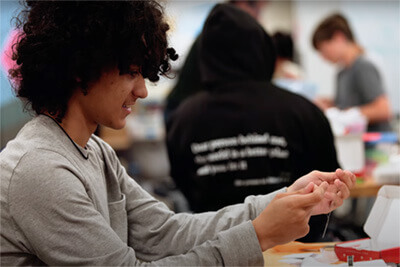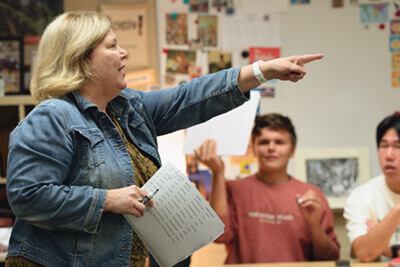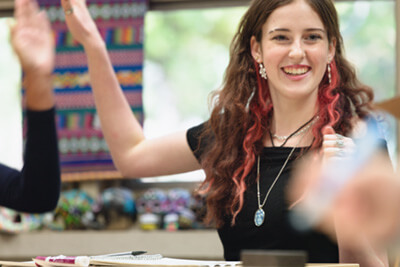February 3, 2025
 When it comes to making a school choice, there are so many different types of environments to explore. Each educational philosophy offers a unique approach to learning, with its own set of strengths, challenges, and benefits for each individual child.
When it comes to making a school choice, there are so many different types of environments to explore. Each educational philosophy offers a unique approach to learning, with its own set of strengths, challenges, and benefits for each individual child.
The transition from Montessori to a PreK-12 college prep school like Mounds Park Academy might seem like a big leap, but many of the traits your child developed in Montessori–like their independence, curiosity, and a love of learning–create a very solid foundation for them. At MPA, we work with families to take things one step at a time and embrace these new challenges and opportunities.
How Does A Montessori Education Compare To Mounds Park Academy?
Montessori education focuses on child development and the creation of supportive learning environments. Montessori schools are rooted in principles that emphasize child-centered learning. Students are encouraged to be independent, self-directed learners who explore subjects at their own pace. The American Montessori Society states, “Montessori education is student-led and self-paced but guided, assessed, and enriched by knowledgeable and caring teachers, the leadership of their peers, and a nurturing environment.” MPA honors philosophies similar to a Montessori learning environment while maintaining a level of academic rigor that prepares students academically for college. This is similar to the Montessori method focusing on child-led learning and independence. While the goal of Montessori schools is to inspire a love of learning, Mounds Park Academy achieves this through academics taught in an experiential way.
Looking at curriculum, MPA has a refreshing take on keeping the material relevant. Like a Montessori approach, where the curriculum is often flexible and individualized, MPA teachers have the autonomy and flexibility to design and change their own curriculum as the class evolves. While all of the traditionally-taught college prep subjects are covered, from STEM to the humanities, it’s the real-world application of an MPA education that takes the material one step further.
Montessori schools typically group children in multi-age classrooms. As a PreK-12 school, MPA students have many cross-division learning opportunities. With different levels of classes offered throughout the curriculum, mixed-age classrooms often arise in Middle and Upper School. There are plenty of opportunities outside of the classroom, too. In theatre productions, for example, Middle and Upper School students make up the cast and crew. Or, because of our no-cut athletic policy, it’s not uncommon for skillful seventh and eighth graders to make the varsity team in their sport. These experiences not only complement cross-age classrooms but strengthen students’ resiliency, communication skills, leadership skills, and friendships.
Crimson Education shares that getting involved in extracurriculars “gives students the chance to explore their passions to discover things in which they may be interested beyond academics while taking time off from hitting the books.” In a Montessori setting, students are inherently encouraged to pursue topics that interest them through the self-directed nature of their learning. At MPA, with choices of more than 100 athletic teams, clubs, and activities and more than 55 elective offerings in Upper School, they are encouraged to do the same.
Will My Student Adjust From A Montessori Classroom To Mounds Park Academy?
Students from Montessori programs can be very successful in a college prep setting like MPA, but the transition may require some adjustment due to differences in the educational structures–but many of the skills and traits they develop in Montessori classrooms will serve them well.
With the Montessori method, academic assessment may be less formal and not centered around grades. Teachers observe students and provide feedback based on their progress and self-motivation. The focus is on whole-child development, including social, emotional, and cognitive skills. Though MPA administers tests, quizzes, and grades, and there may be an adjustment period to adapt to this way of tracking progress, the whole-child approach to learning is still a priority and children’s success is measured by far more than their test scores. It is students’ deep understanding of content and their ability to apply their knowledge across multiple disciplines in innovative ways that make them successful at MPA.
 Because they have been in an environment that grows independent learners and fosters self-motivation, Montessori students will feel empowered in a college prep school where they are expected to manage their own workload, meet deadlines, and push themselves academically. MPA teachers plant the seeds for students to be self-starters, exploring topics that they are passionate about. This is further encouraged through a hands-on and project-based style of academic rigor, and students naturally learn to approach problems from different angles and seek out creative solutions.
Because they have been in an environment that grows independent learners and fosters self-motivation, Montessori students will feel empowered in a college prep school where they are expected to manage their own workload, meet deadlines, and push themselves academically. MPA teachers plant the seeds for students to be self-starters, exploring topics that they are passionate about. This is further encouraged through a hands-on and project-based style of academic rigor, and students naturally learn to approach problems from different angles and seek out creative solutions.
At MPA, we value collaboration over competition. Problem-solving and success are taught through teamwork. When students come to MPA from a Montessori environment, they will feel comfortable joining right in. Montessori students have so much experience working in groups, particularly mixed-age groups, that build collaboration and communication across different channels. These students tend to work well with others, have a good foundation of communication skills, take on leadership roles, and provide support to their peers.
How Can I Prepare My Montessori Student To Thrive At Mounds Park Academy?
Since there will be a difference in how their days are structured, we recommend working on getting used to the new school schedule. Help them keep track of important dates like tests, project due dates, and extracurricular commitments. Use tools like a planner and teachers’ Schoology group updates to stay organized. The more your student stays ahead of deadlines, the smoother the transition will be.
In addition to keeping a consistent schedule, it is also key to develop a consistent study routine. Prepare for tests by reviewing the material regularly, rather than right before. Active study techniques like summarizing, flashcards, practice tests, or explaining concepts to someone else are all ways Montessori students may find themselves feeling prepared and comfortable taking tests.
Your student will likely have a different homework workload than they are used to, but they also have an ingrained love for learning and overcoming challenges that Montessori has prepared them for. “Most Montessori students are very interested in school and love to learn because of the environment they grew up in, which in turn helps greatly to not get burned out or overwhelmed in homework, in my case,” notes Emma Kerns, who joined MPA in ninth grade after Montessori. Create a designated time and place at home for homework and studying, and break down larger assignments into smaller, manageable tasks that are easy to organize and prioritize with the time management skills developed by the Montessori method. We also recommend taking a look at our “Guide To Homework” article for age-appropriate tips on how to guide your student through homework.
Another way to thrive is to become involved with the MPA community. Pursue curiosities and passions or try something completely new with the support of our no-cut athletics and encouragement for students to join and create clubs. Students, no matter what school they come from or if they’re an MPA lifer, are successful, joyful, and supported when they are involved in any of MPA’s many extracurricular options. Athletics, performing arts, clubs, and academic teams at MPA are all designed to help students develop leadership skills and explore interests outside of the classroom. Plus, practicing time management skills outside of academic work will ensure there’s time to make connections and participate socially. A healthy balance between academic programs and extracurricular activities helps students succeed holistically.
 Above all, don’t hesitate to ask for help when needed, whether it’s from teachers, counselors, or peers. “I think talking to teachers and classmates is one of the best skills you can have, and Montessori helped me greatly by enabling those connections,” Emma says. At MPA, every child is known, and this is a college prep environment that values partnership between teachers and families. MPA faculty members are experts in their fields who welcome questions. They want their students to love learning, engage in the concepts, and seek out feedback. MPA teachers are also great resources for guidance on how to study for exams or complete schoolwork for their classes effectively.
Above all, don’t hesitate to ask for help when needed, whether it’s from teachers, counselors, or peers. “I think talking to teachers and classmates is one of the best skills you can have, and Montessori helped me greatly by enabling those connections,” Emma says. At MPA, every child is known, and this is a college prep environment that values partnership between teachers and families. MPA faculty members are experts in their fields who welcome questions. They want their students to love learning, engage in the concepts, and seek out feedback. MPA teachers are also great resources for guidance on how to study for exams or complete schoolwork for their classes effectively.
Choosing the right educational path comes down to the best fit for your student and your family. Montessori students bring a unique set of skills and traits to the college prep environment, including independence, critical thinking, a love of learning, and strong emotional intelligence. Their ability to manage their own learning, collaborate effectively, and think critically will serve them well as they navigate a college prep school. While the transition may require some adjustments, we see students working through them and becoming stronger through the process.